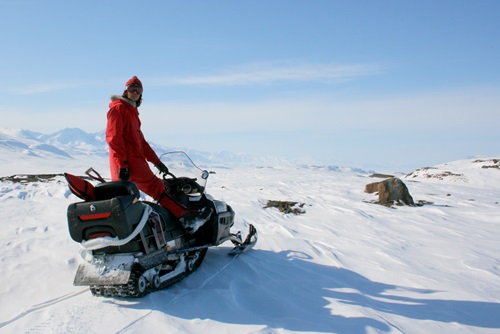University of the Highlands and Islands Research Associate Honored in The New Year Honours List
A research associate with the Environmental Research Institute (ERI), part of UHI North, West and Hebrides, has been named in The New Year Honours List.
Dr Steven Andrews was awarded the Polar Medal for his outstanding achievement and service to the UK in the field of polar research.
The Polar medal was first awarded in 1904 to explorers involved in Captain Scott’s successful expedition to the Antarctic region. Since then, it has been awarded to eminent academics and travelled explorers such as Sir Edmund Hilary, Sir Ranulph Fiennes and Sir Vivian Fuchs.
Dr Andrews works alongside ERI researchers, based in Thurso, as the Flow Country World Heritage Project Coordinator, leading the compilation of the nomination documentation for the UNESCO World Heritage Site bid.
Prior to joining ERI as an associate, Dr Andrews spent 16 months, across 12 expeditions, undertaking geological research in East Greenland.
Stuart Gibb, ERI director, said: “Working in temperatures which at times plummeted below minus 40 degrees and walking over 2600 kilometres, Steven’s research has been published in top international journals and has led to significant advances in our knowledge of the evolution of the North Atlantic and our understanding of the environmental response to climatic perturbations through the Mesezoic era. Steven has passed on his passion for the arctic to numerous colleagues he worked with and mentored across his expeditions to East Greenland. I wish to congratulate Steven on this honour, which is fitting of his knowledge and expertise when it comes to climate change and environmental impact. He has been an incredible asset to the ERI and our research, which is helping to support the bid for World Heritage status for the Flow Country.”
Dr Andrews, who grew up in Sutherland, said: “I have been taken aback to be awarded the Polar Medal, and join a list of such illustrious past recipients. Spending extended periods in East Greenland very much made it feel like home – it even has some of the same rocks we see in the North West Highlands of Scotland, which split from East Greenland when the North Atlantic opened some 50 million years ago. It has been a great pleasure to share time in the field and writing up our findings with so many interesting and insightful colleagues to whom I am very grateful for their support.”
Dr Andrews, who also works for Highland Council, continues to work on his extensive East Greenland datasets for publication.


